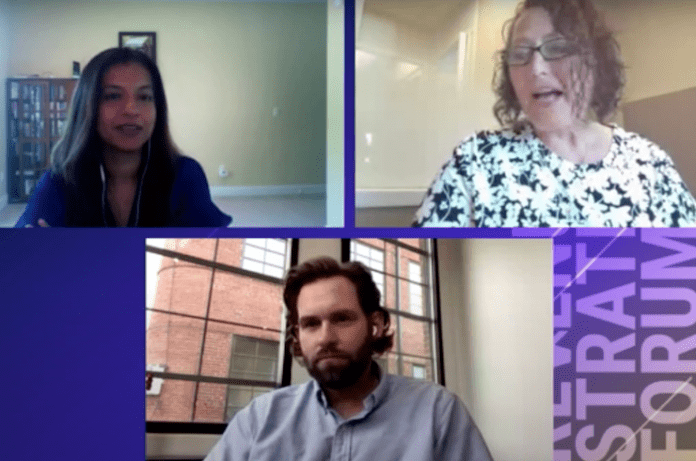
Silver Hospitality Group, in partnership with Duetto, hosted the first Revenue Strategy Forum on May 19, 2021, and brought together industry leaders in hospitality and technology for conversations about the economic outlook and technology in a post-pandemic environment. In a panel entitled “Navigating Uncertainty in Profitability” led by Founder and CEO of Dragonfly Strategists Caryl Helsel, Vice President of Revenue Management for Benchmark Hotels & Resorts Priya Chandnani and President of Graduate Hotels David Rochefort shared their thoughts about controlling distribution costs, staffing shortages, the future of revenue management, and more.
Many hospitality companies were forced to scale back in multiple ways throughout the pandemic. For distribution costs, Chandnani said that Benchmark is “cautious around distribution costs to begin with” but that their “ability to continue to drive direct [bookings] has been key in keeping those distribution costs low.” Benchmark “continued to invest in marketing as we went through the pandemic. And that I think served us really well: As we started to open up those hotels and demand started to rebound, we continued to maintain our contribution through our direct channels, and that really helped with keeping our distribution costs low.”
Rochefort said that Graduate has grown exponentially over the past seven years since its inception, but that it had to shift its organization and perspective to adjust to the pandemic. However, he said, “In revenue management, we did move to both somewhat of a centralized and regional perspective.” But, Rochefort added, Graduate “never turned it off. We never let every revenue manager go.”
“We saw a lot of our competitors cutting their teams and we wanted to make sure we were ready to go and the engine was idling but not turned off,” Rochefort explained. “We talked a lot about how we could ramp up out of this faster. We did downsize, but leaned heavily into our revenue management system—Duetto—and then centralized a bit knowing we…could cover more hotels… We will eventually thoughtfully add back over time as those needs arise.”
Panelists agreed that perspectives on revenue management systems have changed throughout the pandemic. Chandnani said that Benchmark saw different demand trends and adjusted to them. She said, “Our ability to use data to make our decisions rather than emotions—or for lack of a better word, muscle memory—is essential.”
Rochefort agreed that revenue management technology helped give Graduate an accurate understanding of forecasting and aided revenue teams in adjusting to the changing landscape. He noted that what benefited their teams the most was “honest and open” communication about what is or isn’t achievable. “I think we’ve been clear with our team: This is not the time or place to pick a number and cross your fingers about hitting it. It’s been a much more honest and real conversation around our forecasting so that the rest of our organization can adapt as needed, and revenue management leads all of those conversations.”
And it’s also no secret that all industries—but the hospitality industry in particular—are experiencing staffing shortages. Chandnani said that this is a “very real problem in our industry right now” and that “as demand starts to climb back, there are a couple of strategies we’ve put in place to combat some of the staffing issues.” Reach-driven strategies and achieving optimal RevPAR are just some of what Benchmark is doing. “We are definitely playing a more aggressive rate strategy at this point… closing or even restricting some of our standard room types to be able to accommodate our teams better.”
Rochefort said Graduate is 600 roles short of where the company wants to be, but that it has shifted its technologies throughout the pandemic to make the best decisions for its employees. He added that at the beginning of the pandemic, Graduate closed its hotels three weeks before the rest of the industry to preserve cash. He said, “Our goal was to reopen every hotel first in all of our markets as we started to see demand start to come back to a place… [We] are lucky to have every hotel open and operating right now, including new hotels.”
With the hotel landscape constantly changing and every market behaving differently in its recovery, “keeping up with understanding the changes and regulation as well as demand trends” is important to Chandnani, and automation is part of that. She adds, “To me, communication has been just our biggest friend through this entire phase of closing hotels, opening them back again, adjusting to changes and demand, making sure that we have our systems and processes in place to talk to one another, trust one another, and really rely on one another.”
As for the future of recovery, Rochefort and Chandnani said they are seeing pace exceeding 2019 levels. Rochefort said that Graduate is mostly seeing pickup around school sports and move-in dates, as their hotels are concentrated in university towns and secondary and tertiary markets.
Chandnani noted that Benchmark is performing better in rate, especially this summer. She said, “Personally, I think this summer is going to be the best summer for us ever.” But Benchmark is also looking to the second half of 2021, and she adds, “As the summer starts to ramp down, we will definitely see a shift… and for us, it’s important to react to that sooner rather than later.”











